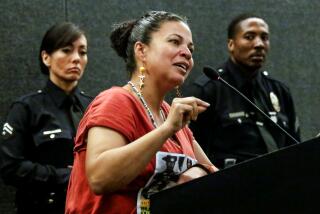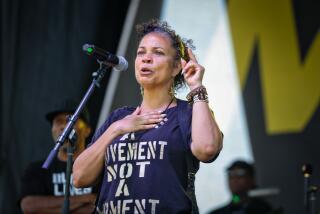Terror Suspect Uses Trial to Denounce U.S.
- Share via
PARIS — Georges Ibrahim Abdallah, charged with complicity in the murder of an American military attache and an Israeli diplomat, opened his defense Monday by describing himself as “an Arab combatant” against “the Yankee criminal, murderer of all the underprivileged on earth.” Then he refused to attend the remainder of his long-awaited trial.
But, before demanding his right to return to prison, the 36-year-old Lebanese Christian, accused of heading the terrorist Lebanese Revolutionary Armed Faction, denied any part in the killings even while applauding them.
“Our people,” he said, “have not conferred the honor on me of taking part in these anti-imperialist acts that you attribute to me.” But, he went on, “I, at least, have the honor to defend their legitimacy.”
Right to Withdraw
Under French law, the defendant has the right to withdraw from a trial. Abdallah did so as soon as Georges Kiejman, the lawyer representing the U.S. government and the family of the American military attache, rose to reply to Ibrahim’s opening statement.
“I refuse to have any contact on this terrain with a Yankee criminal!” Abdallah shouted, demanding that his guards take him away.
Chief Judge Maurice Colomb tried to persuade him to listen to Kiejman but then gave in to Abdallah’s demands. Abdallah is expected to stay away from the rest of the trial.
More Terrorism Feared
There was an expectant and somewhat tense air in Paris as the trial opened because many government officials made no secret of their fear of another wave of terrorism by relatives and associates of Abdallah. Demanding his release, the terrorists frightened Parisians last September with a series of bombings that killed 11 people and wounded more than 160.
There has been a good deal of speculation in the French press, in fact, that the government of Premier Jacques Chirac may have reached some kind of understanding with the bombers for a truce pending the trial.
The Paris police were reinforced by officers from the provinces more than a week ago, and small squads of police, armed with automatic rifles, are patrolling the streets of the city. Everyone who entered the courtroom Monday was carefully searched by police.
Abdallah is accused of complicity in the murder of Lt. Col. Robert C. Ray, the assistant U.S. military attache, in Paris in January, 1982; the murder of Yacov Barsimantov, an Israeli diplomat, in Paris in April, 1982, and the attempted murder of Robert O. Homme, the U.S. consul, in Strasbourg in March, 1984. All three were shot in the head, and responsibility for all three crimes was claimed by the Lebanese Revolutionary Armed Faction.
At the opening of the trial, Abdallah, who comes from a village in northern Lebanon now under Syrian control, listened attentively, occasionally taking notes. He had an Arabic interpreter at his side but did not consult him.
Despite a luxuriant dark beard, Abdallah, wearing a thin, khaki parka, looked surprisingly frail, cocking his head from side to side to follow the procedures. When he stood up, stoop-shouldered, to deliver his statement to the court, Jacques Verges, the defense attorney, clutched the top of his client’s hand on the railing and kept it there throughout most of the speech.
Statement Already Published
The defendant’s statement, although dramatic, was not a surprise since a copy of it had been published a few days earlier in a French weekly news magazine. Abdallah, who reportedly wrote the six-page statement by hand, had obviously memorized it. He began by speaking softly and measuredly but became excited as he neared its conclusion.
Abdallah, who is now serving a four-year prison sentence for possession of false documents and illegal weapons, questioned the right of the French court to try him for what he called acts of war when it was not trying what he regarded as the true criminal--the United States.
“With what independence and serenity do you pretend to judge these acts of war,” he mocked, “when you isolate them from the imperial aggression perpetrated against my people?”
“I am here,” Abdallah went on, “to simply demand that you wash your hands stained with our blood and the blood of our children before you attempt to judge us.”
Relevance Challenged
After Abdallah left the courtroom, Kiejman arose to tell the judges that the defendant’s speech bore no relation to the reality before the court--the murders in Paris and the attempted murder in Strasbourg.
Defense attorney Verges, who is also the defense attorney of Klaus Barbie, the Nazi Gestapo commander of Lyon during World War II, is known as an iconoclastic lawyer who likes to put the French government on trial in a political case.
Verges has asked for former Premier Laurent Fabius and other prominent French politicians to appear as witnesses during the trial, but all have refused. Judge Colomb said the court will rule later on Verges’ request that they be forced to appear.
The defense obviously wants Fabius to answer questions about a reported deal between the French and Abdallah’s clan in 1985 to release Abdallah in exchange for a French hostage in Lebanon. The hostage was released, but Abdallah was kept in custody when police, who had been holding him only on relatively light charges, discovered a cache of arms in his Paris apartment that included the weapon that killed Ray and Barsimantov.
Seven Judges, No Jury
The trial is being held before seven judges and no jury under a law passed by the French Parliament last year after jurors withdrew from a terrorist trial in the face of death threats from the defendant.
The judges preside in an elegant chamber with an enormous tapestry, carved wooden walls and a bust of Marianne, the symbol of the French republic. The chamber, the largest criminal courtroom in the Paris Palace of Justice, is a historic one. Novelist Emile Zola was tried there on charges slandering the government during the Alfred Dreyfus case at the turn of the century. The court also was used for many collaborationist trials after World War II.
More to Read
Sign up for Essential California
The most important California stories and recommendations in your inbox every morning.
You may occasionally receive promotional content from the Los Angeles Times.













